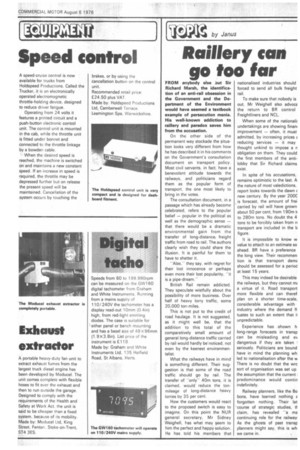Raillery can go too far
Page 49

If you've noticed an error in this article please click here to report it so we can fix it.
FROM anybody else but Sir Richard Marsh, the identification of an anti-rail obsession in the Government and the Department of the Environment would have seemed a textbook example of persecution mania. His well-known addiction to raillery and paradox saves him from the accusation.
On the other side of the permanent way stockade the situation looks very different from how he has described it in his comments on the Government's consultation document on transport policy. Most civil servants, in fact, have a benevolent attitude towards the railways, and politicians regard them as the popular form of transport, the one most likely to bring in the votes.
The consultation document, in a passage which has already become celebrated, refers to the popular belief — popular in the political as well as the demographic sense — that there would be a dramatic environmental gain from the transfer of long-distance, freight traffic from road to rail. The authors clearly wish they could share the illusion. It is painful for them to have to shatter it.
"Alas," they say, with regret for their lost innocence or perhaps even more their lost popularity, "it is a pipe-dream.
British Rail remain addicted. They speculate wistfully about the possibility of more business. Over half of heavy lorry traffic, some 20,000 ton-miles.
This is not put to the credit of road haulage. It is not suggested, as it might well be, that the addition to this total of the comparatively small amount of general long-distance traffic carried by rail would hardly be.noticed, not even by the keenest environmentalist.
What the railways have in mind is something different. Their suggestion is that some of the road traffic should go by rail. The transfer of "only" 40m tons, it is claimed, would reduce the tonmileage of long-distance heavy lorries by 35 per cent.
How the customers would react to the proposed switch is easy to imagine. On this point the NUR general secretary, Mr Sidney Weighell, has what may seem to him the perfect and happy solution. He has told his members that nationalised industries should forced to send all bulk freight rail.
To make sure that nobody is out, Mr Weighell also advoca the return to BR control Freightliners and NCL.
When some of the nationali; undertakings are showing finani improvement — often, it must admitted, by increasing prices reducing services — it may thought unkind to impose a n obligation on them. They could the first members of the antilobby that Sir Richard claims exist.
In spite of his accusations, remains optimistic to the last. A: the nature of most valedictions, report looks towards the dawn c new century. By the year 200C is forecast, the amount of frei carried by rail will have grown about 50 per cent, from 190m ti to 280m tons. No doubt the 4 tons to be forcibly taken from n transport are included in the 12 figure.
It is impossible to know w value to attach to an estimate so ahead. BR have a preference the long view. Their recommen. tion is that transport demE should be assessed for a period at least 15 years.
This may indeed be desirable the railways, but they cannot we a virtue of it. Road transport more flexible and can theref plan on a shorter time-scale, considerable advantage with industry where the demand fl, tuates to such an extent that ii unpredictable.
Experience has -shown h long-range forecasts in transp can be misleading and e‘, dangerous if they are taken 1 seriously. Politicians are bound have in mind the planning wh led to nationalisation after the w There is no doubt that the wrc Sort of organisation was set up the assumption that the current I predominance would contin indefinitely.
Railway planners, like the Bo bons, have learned nothing z forgotten nothing. Their at 'course of strategic studies, tf claim, has revealed "a ma continuing role for the railway! As the ghosts of past transp planners might say, this is wh, we came in.




















































































